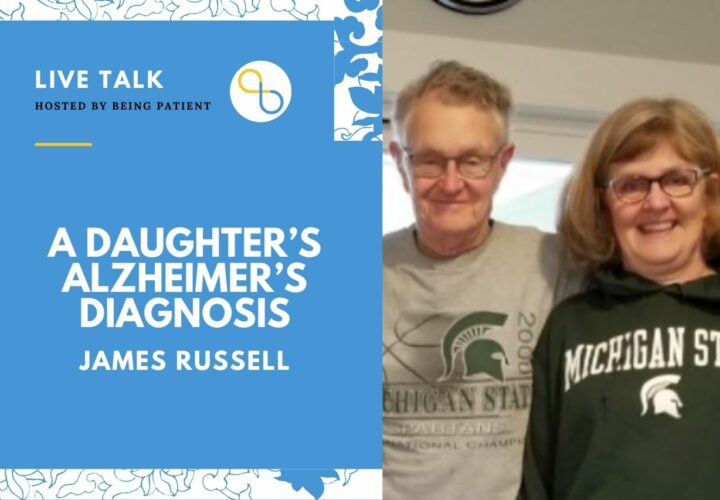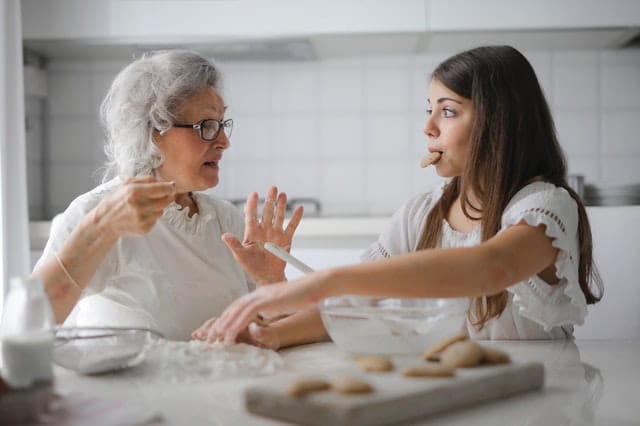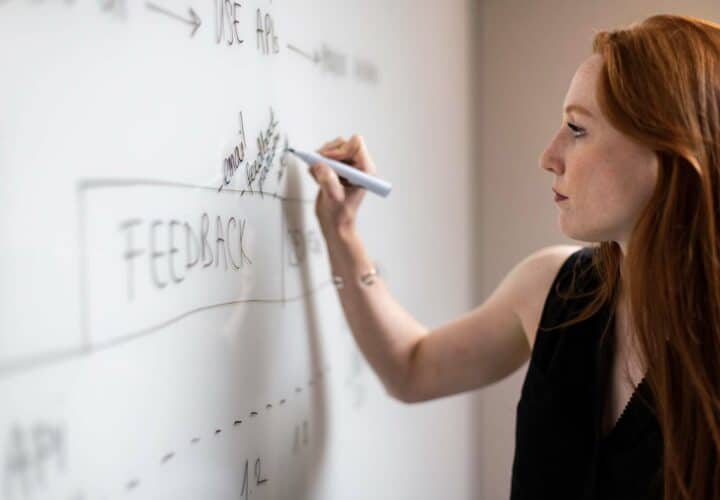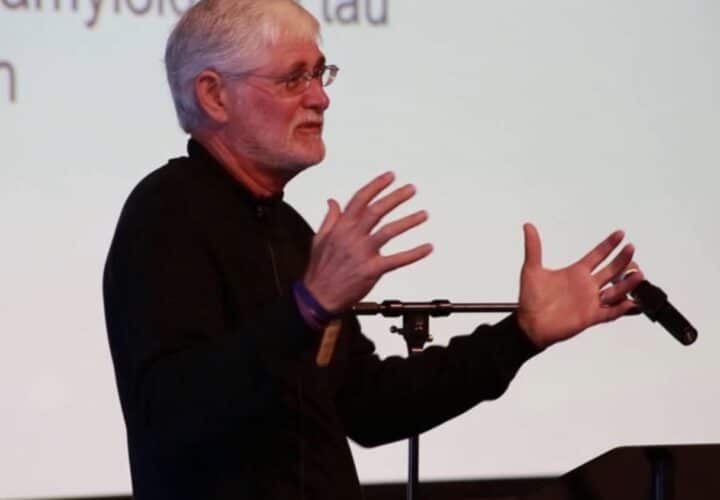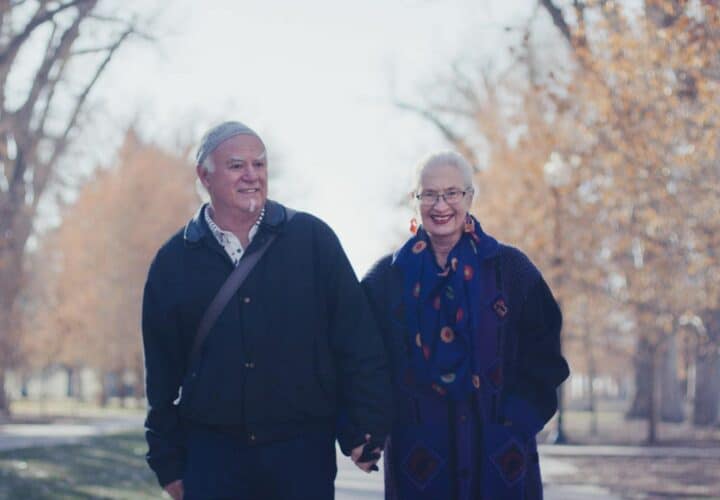James Russell is the author of the blog Nevertheless Dementia, We Persist. His daughter Lynne Russell lives with early-onset Alzheimer’s. James shares his family’s story of love, care and resilience.
Lynne Russell, a mother of three sons, was only the 51 when she was diagnosed with Alzheimer’s in 2017. Over the years, Lynne’s condition has steadily declined, her father James Russell said, and she is now under at-home hospice care. As James reflects on looking after for her during these years, he notes that the support from her friends and family has been a bedrock to her wellbeing.
As part of our LiveTalk series, Being Patient speaks with James about his daughter’s early symptoms of Alzheimer’s, her transition from living at home to a care home, and inspiration behind his blog Nevertheless Dementia, We Persist.
Being Patient: Tell us a little bit about Lynne’s background?
James Russell: When Lynne left college, she started with Microsoft as a recruiter in the very early days when they were hiring a lot of high-tech people to start Microsoft’s explosion. She got to know [Bill] Gates and [Steve] Ballmer because it was a small firm at that stage. She made lifetime friends. They worked together, explored together, and I say that only because they will come back later to help her out in her care.
She left there to raise a family and she had her boys. Then, she was a consultant doing different work with the Bill & Melinda Gates Foundation, Amazon and some other firms in the high-tech area. Then, [she] finally decided in 2009 that she wanted to be a special education teacher. So she went back to school, took out federal government loans to pay for every bit of it.
Then, [she] went to work in Renton low-income public school system teaching special education for children from the age of kindergarten to eighth grade, and she loved it. She finally moved from Renton back to Seattle because she was taking care of her three boys.
There were two teenagers at the time she was diagnosed who were 19 and there was one who was 14. She was working at that time for the Seattle public school system, renting a house and very disturbed by all of the memory problems she was having.
Being Patient: What were the early symptoms of Alzheimer’s that she experienced?
James Russell: In 2013, her younger brother and her younger sister were noticing that she had a lot of memory problems [like trouble] finding her keys, getting the boys organized to help her out with the keys … It was unusual for [her sons] and they were disappointed in the way she was taking care of the boys and the way she was behaving.
She simply brushed it off as having ADHD. She self-diagnosed as that. But over the years, we kept noticing more and more problems. She would forget which foods she brought to celebrations of someone’s birthday, and they had to tell her which food she brought, what to take home. Then, they got lost trying to get together on a campground. She began to tell our youngest daughter that she was having problems with the work she had, the interfaces, and she was so bad she was going to get fired.
My youngest daughter said there is no way that was Lynne. I mean, she was always technologically on top. She taught her boys to use technology. They’ve told me that everything they knew came from her and she was confident in what she did, and yet she thought she was going to get fired. She was wrong about that. They thought she was doing a good job.
But she had increasing difficulties at home with the boys … The boys started noticing she couldn’t cook. But they supported her. They backed her all that time because she was their mom and they loved her. They took care of her. We didn’t hear about a lot of those things that we might have if they had reached us sooner.
But she finally got to the point where she was willing to take a test and the test she got showed she had mild cognitive impairment in August of [2016]. The doctor asked her if she wanted to continue trying to work and she said, ‘Yes, I want to try.’ She had a very good friend in special education who supported her.
But by February of 2017, when they [gave] a second series of psychological tests, [the tests showed] she had advanced early-onset Alzheimer’s. She resigned immediately and began to let us take care of her. Next day, she signed over all power of attorneys for medical, personal [and] legal [affairs] with me and my wife Karen.
That was the start of our care for her, with a commitment and an understanding that she had a diagnosis. Up to that time, she refused to admit it. She didn’t want to lose her home, her family, her kids, respect, her job, her money, her income. Everything would be gone with that diagnosis. She fought it.
Being Patient: Lynne’s sons played a big role in supporting her, and by 2018, she moved into assisted living. Tell us about that transition.
James Russell: She had fought it for some time. She went to support groups that the doctors [recommended] to her. But she came home … and said, ‘They’re 20 years older than I am and they’re not dealing with the same issues I am. I can’t relate to any of them. I’m not going back.’
She walked into [assisted living] knowing she was going to be 20 years younger than the youngest person. She said, ‘This is going to be my mission: to help [the staff] care for those people.’ The staff at Aegis, which is where she is now, treated her as a caregiver and treated her as a friend. Many of the supervisors over there were her age, and they were looking at her thinking, ‘Oh my god, but for the grace of God, go I.’
They worked with her and gave her chances. They loved her. She became the most active resident there. She participated in programs. She was on the resident’s council immediately. It was a marvelous change for her, and she accepted it very well.
Being Patient: You and your wife lived close to Aegis?
James Russell: Early in 2018, we had bought a house in Renton which was an over-55 retirement community for us, which we loved to be in. That was a 25- or 30-minute ride down to see Lynne, which was working out fine. Lynne came up to see our place. We went down there. Friends came in and visited. We were pretty active and she was pretty safe. She had a lot of guests coming in. Those friends from Microsoft started to visit her too, so that helped out.
Then in December of 2018, the Microsoft group got together, because they had participated in two Alzheimer’s Walks – 2017 and 2018 – and said, ‘We can do more.’ So, they threw a birthday party for her. About 12,13 or 14 of her friends came from around the United States to come see her at the birthday party and to see each other, because they hadn’t come together at that point. They decided that they were going to support Lynne. Through the cooperation of her friend, Nancy, they did a lot of things to visit her and talk with her. We began to get a lot of help.
It was in January of 2019 when my wife was diagnosed with pancreatic cancer stage four. That forced me into caring more for her than I could care for Lynne. Fortunately, she was doing well at Aegis and the boys were coming over to see her. They had gotten jobs at Dick’s and [Dick’s] paid for the college tuition.
[Lynne’s sons] were working well together and enjoying being with their mom. They recovered emotionally from what they had been through. They helped. Lynne came up and stayed with us during Karen’s cancer treatment and everything else.
Karen finally gave up the treatments and went into hospice at our home, which was extremely difficult. We had to make some kind of changes because it was too hard to coordinate. Costs were going crazy.
I noticed that I could put Karen in a hospice program at Aegis. I talked to them and they said, ‘Yes, we’ll take her for a hospice patient.’ So I asked Karen and I said,’ Would you like to go to Aegis and be with Lynne in your final hospice?’ Well, of course, that’s what she wanted. She was thrilled.
Then we talked to hospice and said we want to move her. Well, hospice doesn’t like to move patients from one hospice facility to another, because hospice gives you all of your beds, your medications, your doctors, your nurses. When you move to another location, all of that stops and you have to start over with a whole new core. They were very worried about a change like that affecting Karen and losing control of her and losing her in the process. Everybody in my family disagreed with it.
I went back and told Karen, ‘There’s a lot of resistance to this move with hospice. You want to stay with it?’ She said, ‘Yes.’ I knew she was gonna be fine, and so we moved her. She was there for about three months.
At that stage, I rented out my house and moved in there also to be close to her. Then we lost her in September of 2019. I got an apartment right next to where Lynne lived and I’ve been there ever since. I can get over there in five minutes and see her twice a day.
Being Patient: That must have been such a difficult time for you: the passing of your wife in 2019, then COVID-19 and the isolation brought on by restrictions. What was that like for you?
James Russell: One of the most important [things] was I had a purpose in life, and my purpose was Lynne. I could channel all that isolation and loneliness for me, and inability to travel and everything else, to caring for Lynne. I bought her a Starbucks iced coffee every single morning and took it over to her and gave it to her. They could take it up to her room. That’s what she used to do with her life.
Then, we got the boys involved and we put in a portal in her room. We put in an Echo. We posted sheets of music that she likes, so anybody could come into the room and say, ‘Echo, please play this for her.’
We had video chats. I started setting up Friday night at five o’clock video chats, [sending] it out to people and [saying] she’s going to be available for 15 minutes from five to 5:15 if you want to join with that video, you can, just two or three people. Two or three from the Microsoft posse would join in and talk to her. Pam and [her Aunt] Jane would talk to her at that time. Her cousin and her friends could all talk to her.
I talked to her daily. She would call me on her phone pretty much anytime early in the morning to late at night when she was lonely, which is what I wanted her to do. I was able to learn how to calm her down.
But that took a toll on me because it was chewing up my sleep time and interrupting what I was trying to do in terms of writing. But the process of writing, explaining on my blog what we were doing to try to take care of her – going over to visit, [leaving] things for her even though I couldn’t see her – gave me a lifeline to not focus on how tough it was.
Being Patient: How important has the blog been in terms of building support from family and friends?
James Russell: From starting out as her caregiver, I evolved to [being] more of a team leader [of] caregivers. They could do things I couldn’t do … If I had my dad coming back to me, talking to me every day, [it] could get pretty tiresome. They were able to give what I could never give.
So, I realized my job was to make sure that as many people knew how to care for her as possible, and that included working with all the staff and saying, ‘This is what’s working. This is what’s not,’ learning from them what works and what doesn’t, how they organized, what kind of materials they have, what kind of activity she has, where she could go, what she could do, getting her out, driving her around, taking care of her, feeding her, all of those kinds of things.
I could share that on the web so that people would be more willing to come see [Lynne]. Then, they started showing me what happened. I said, ‘Can I post it on the blog?’ And they said, ‘Yeah, post it on the blog.’ Now, Nancy posts on the blog and all the Microsoft friends see what she did, and so that starts to build support.
I came to believe that it was not my job so much to care for her as to be a team leader to make sure she got the care that she needed. That meant communicating with all of them about what was happening, how they could help and talking about what each other were doing.
Being Patient: Lynne is now in hospice?
James Russell: She’s had a steady decline, and she went from the Alzheimer’s sixth stage to the Alzheimer’s seventh stage back in August of 2021, which meant that she was completely incontinent but still able to talk and eat and everything else.
But on January 22, I asked for information about what her status might be. The hospice team was called in and they did an assessment as to whether she belonged [to] hospice already, which surprised me.
She had lost more than 10 percent of her weight, which qualified her for hospice. She had two seizures – she’s epileptic – that qualified her for hospice. She had wild mood swings. That qualified her for hospice. it was a triple whammy there that qualified her for hospice, that I as a caregiver had missed. I knew each of those things separately but didn’t realize the implications of that.
So, she went on hospice. In December, she weighed 135. In January, when she went on [hospice], she weighed 130, and now she’s down to 120 or below. She’s gotten less and less able to walk. I spoon feed her twice a day, and I walk with her. She knows me less than she used to. I think she knows me as somebody that can help her. I don’t think she’s quite sure who I am. It doesn’t matter. I’m there. She knows I’m there.
I think there are several things that we need to understand about being a caregiver, and the experience of caregiving with somebody, especially somebody with Alzheimer’s. A friend of mine, Carol Hosler, and I have been working on that, and it comes from a man by the name of Sam Wells, who says there’s eight components to making sure that you’re living the word of God in terms of dealing with people. But we’re applying it to caregiving.
The first is that you have to physically be there, and there’s a tendency to think that’s not that important. But I’m there a lot when she’s not saying anything, and she knows I’m there. She will look over at me, smile, be a little comfortable, and then look off into the other world.
The second thing to do is to be very, very attentive to what she’s doing. I watch her as much as I watched her when she was two and three years old in the bathtub, when I was washing her, or on a changing table. She’s fascinating to watch. She’s full of mystery.
That’s the third thing you have to have respect for: the mystery, the mystery of what’s going on, the mystery of Alzheimer’s, the mystery of my relationship with it. It’s then that I can discover things that I need to do for her. If you do those three things. You’ve done as much as you can as a caregiver.
If your loved one experiences delight, participates with you, partners with you, and enjoys it with you, it will be a glorious experience to remember.
The interview has been edited for length and clarity.
Contact Nicholas Chan at nicholas@beingpatient.com
